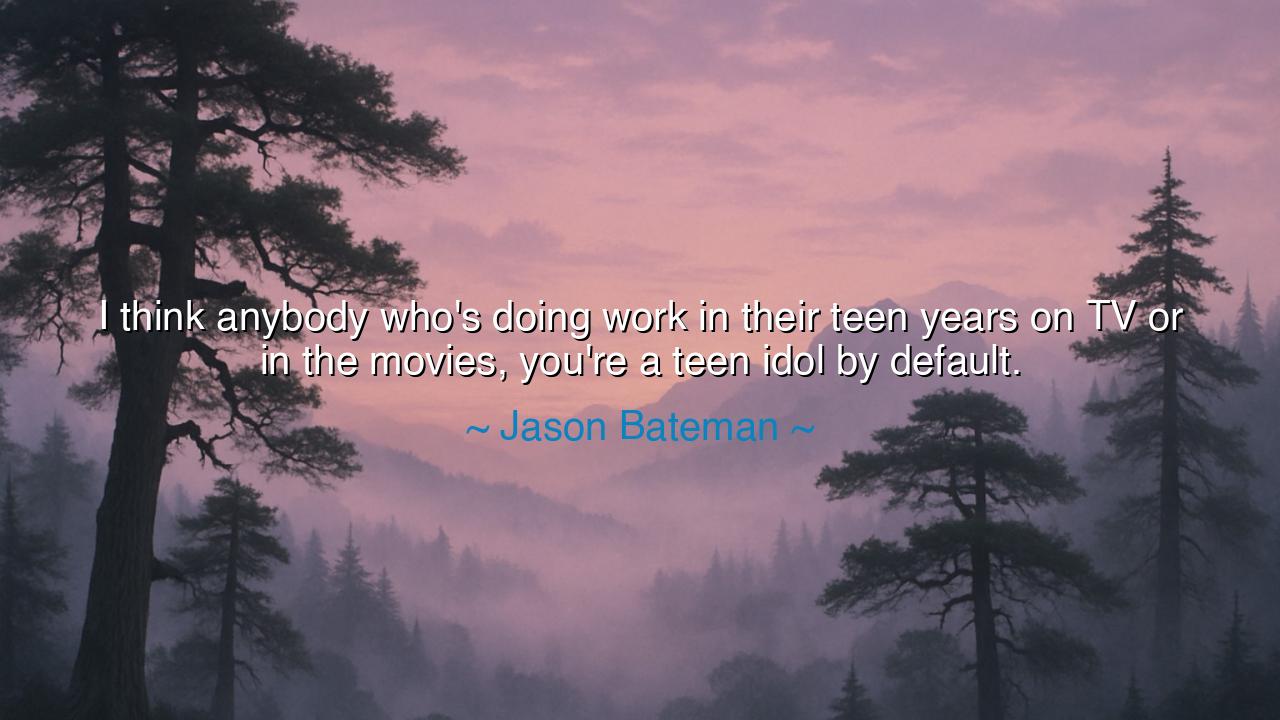
I think anybody who's doing work in their teen years on TV or in
I think anybody who's doing work in their teen years on TV or in the movies, you're a teen idol by default.






When Jason Bateman declared, “I think anybody who's doing work in their teen years on TV or in the movies, you're a teen idol by default,” he revealed the strange and unyielding power of public perception. His words remind us that in the realm of fame, choice and intention are often stripped away. The young actor who simply seeks to practice his craft is nonetheless transformed, in the eyes of the audience, into a symbol of youth, a mirror for millions of others coming of age.
The origin of this wisdom lies in Bateman’s own life. Having begun his career as a child and teen actor, he experienced firsthand how quickly the label of “teen idol” could be placed upon him, regardless of his own wishes. For the culture of television and film thrives on images, and the image of a youth upon the screen inevitably becomes a projection point for admiration, fantasy, and longing. In this way, the actor is swept into an identity they did not always choose, carried upon the tide of mass perception.
History offers us many such parallels. Consider the youthful Lord Byron, whose poetry caused society to name him a star before such words were common. He found himself adored not just for his art but for his image, idolized by readers who saw in him not simply a poet but a symbol of romantic rebellion. Or reflect upon Shirley Temple, who, as a child star, was lifted into adoration so vast that her image defined an era. In each case, as with Bateman, the role of idol was conferred not by personal choice but by the will of the crowd.
Bateman’s insight also speaks to the burden of expectation. To be a “teen idol” is not merely to be liked; it is to be placed upon a pedestal, where flaws are magnified and mistakes become spectacles. The youth who should be allowed to stumble and grow must instead bear the weight of cultural adoration. What might have been simply a role on television becomes an emblem, and what might have been simply a performance becomes a declaration of identity in the eyes of the audience.
The deeper meaning here is that public life robs innocence of its shelter. When a teenager’s work is broadcast, the private journey of adolescence is no longer private. Every glance, every smile, every gesture becomes an object of interpretation. To say one becomes an idol “by default” is to admit that the process is not chosen but imposed. The actor may resist, but the tide of culture does not ask permission.
The lesson for us is to be mindful of the way we idolize the young. To admire is natural; to project fantasies onto them without regard for their humanity is dangerous. If we see a teen actor or musician on stage, let us remember that beneath the image is a person still growing, still vulnerable. Their art may inspire, but they themselves are not archetypes—they are youths, navigating the same struggles as any other.
Practical counsel flows: if you are young and find yourself admired, do not let the weight of adoration define your identity. Stay grounded, seek wisdom, and remember that the pedestal of idolhood is fragile and fleeting. If you are one who admires, keep your heart balanced: cherish the work without consuming the person. And for all, let us be cautious of how quickly we create idols, for the crown of fame often sits heavy upon the head of youth.
Thus let Jason Bateman’s words endure: to be a teen in the spotlight is to be an idol, whether one seeks it or not. Fame has a way of remaking identity in the eyes of others. Yet the wise will remember: behind every idol is simply a person, longing not only to be admired but to be understood.






AAdministratorAdministrator
Welcome, honored guests. Please leave a comment, we will respond soon